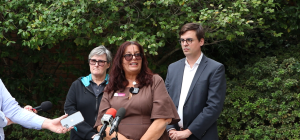More than 80 percent of disadvantaged households do not have stable access to food that meets their nutritional needs, according to the initial findings of a study into entrenched disadvantage in Perth.
Two thirds of households with children indicated that it was often or sometimes true that they couldn’t feed their children a balanced meal, “because they couldn’t afford to”. Of these families, adults have lower food security than children, potentially sacrificing food and going hungry in order to feed their children. Food security is the ability to access and afford the quality and quantity of food that meets nutritional needs without having to rely on emergency food programs.
The Western Australian Council of Social Service (WACOSS) Chief Executive Officer, Louise Giolitto, says the initial findings paint a stark picture, but are not surprising.
“The data confirms that the key driver of food insecurity is poverty – low income and inadequate social security payments.
“Some households are being forced to choose between heating and eating, and this is resulting in parents who are going without meals so that their children are not hungry.
“It’s very concerning, given the range of consequences food insecurity has on social isolation, health, education, and work outcomes,” said Ms. Giolitto.
100 Families WA is a collaborative research project between eight not-for-profit organisations in the community services sector and The University of Western Australia (UWA), aimed at understanding the lived experience of poverty, entrenched disadvantage, and social exclusion.
The project was launched in May 2018 and will continue through until 2022, with a baseline study involving 400 families, and in-depth interview with 100 families.
Professor Paul Flatau, Director of the Centre for Social Impact UWA and lead researcher, says the end goal is to make a difference to the lives of families by supporting them to break free of entrenched disadvantage.
“The families involved in the study are bravely sharing their real-life experiences. We hope to shine a light on what families themselves want to achieve and what structural factors limit opportunities and positive social change,” said Professor Flatau.
WACOSS, Anglicare WA, Ruah Community Services, Wanslea, Jacaranda, Centrecare, UnitingCare West, Mercycare, the UWA Social Policy Practice and Research Consortium and the Centre for Social Impact UWA are collaborative partners on the project.
The initial findings will be part of a wider report of the baseline findings, due to be released in August.
Ends.
To download a PDF of this media release, click here.
Media Contact: Laurene Coller, Communications Officer, WACOSS, [email protected], 0419 316 557



